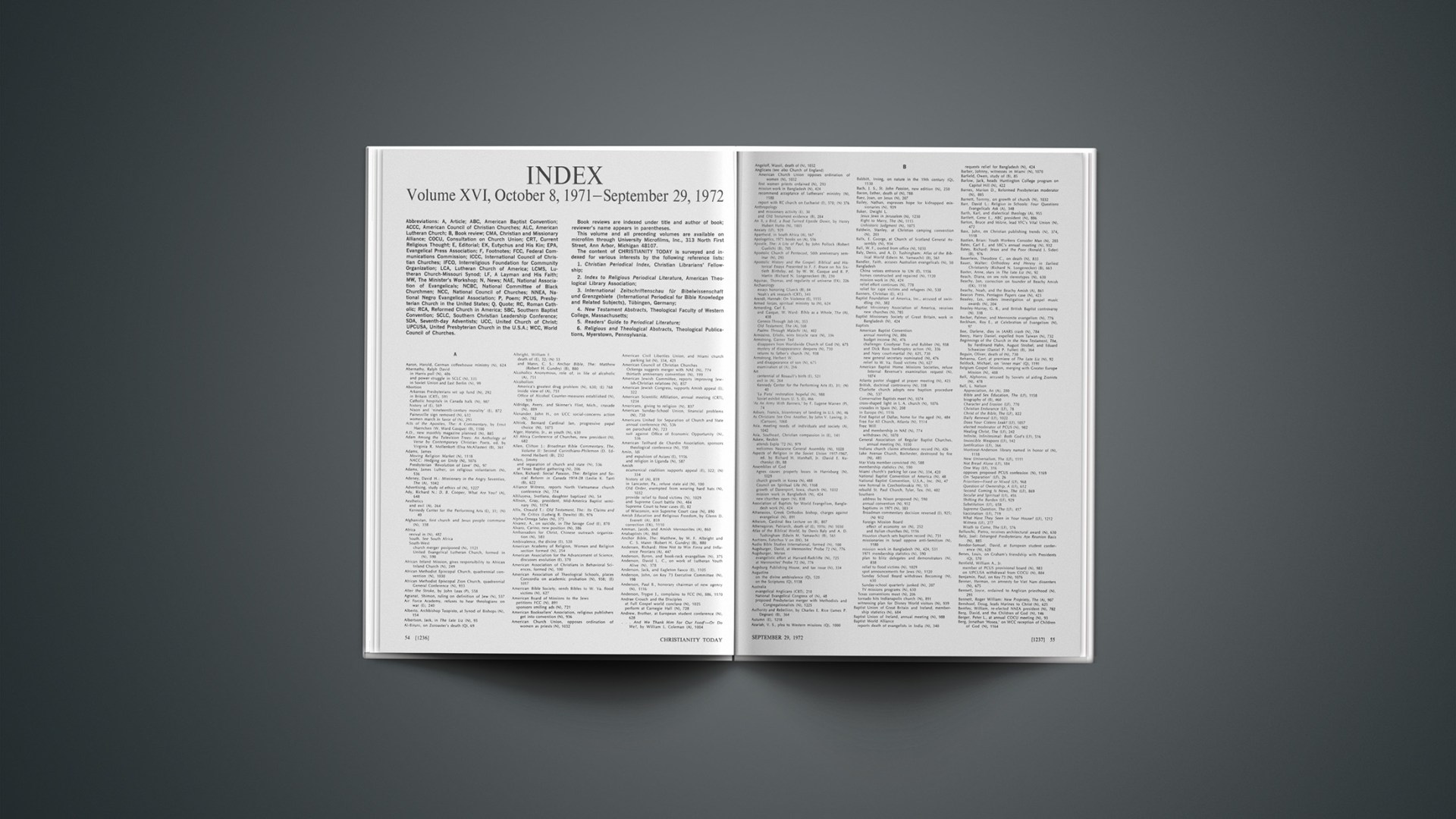For over a quarter of a century the American Scientific Affiliation has been relating scientific data to Christian convictions. Its twenty-seventh annual meeting, held in the labyrinthine halls of York University in suburban Toronto, endeavored to find a way through one of the great mazes in contemporary philosophy of science. Under the general subject “Presuppositions of Science: A Christian Response,” participants struggled with the question, Do scientific advances actually bring about greater objective knowledge of reality, or do they merely signify the substitution of one metaphysical paradigm for another without necessarily moving closer to the real nature of things?
Two major sessions were devoted to the metaphysical vs. objectivist view of scientific progress, and the issue spilled over into many other discussions. What made this inevitable was the strong representation of Calvinist presuppositionalists (Stanford Reid, Robert Knudsen) and Dooyeweerdians (Bernard Zylstra) on the program.
As might be expected, those who hold to an ultimately untestable theological starting-point find comfort in the notion that science may, after all, be dealing not with brute facts at all but with data that become “facts” as they are incorporated into particular scientific constructs. Thomas S. Kuhn’s Structure of Scientific Revolutions, which persuasively sets forth the metaphysical interpretation of scientific activity, is already paralleled in Calvinist-presuppositionalist circles by Gordon H. Clark’s Philosophy of Science and Belief in God.
Reid, in his characteristically aggressive opening address, chastened the eighteenth-century Anglican apologists Berkeley and Paley and their ilk for trying to “prove Christianity rationally,” thereby “adopting the rationalists’ view of an autonomous universe.”
In opposition to such a “pretended autonomy,” Zylstra, of the Calvinist-Dooyeweerdian Institute for Christian Studies in Toronto, chided evangelicals such as Carl F. H. Henry, and asserted that the “biblically inspired view of created reality can be given theoretical formulation in terms of Herman Dooyeweerd’s reformational philosophy.” Zylstra’s attempt to show the application of Dooyeweerd to such pressing contemporary issues as territorial waters and airspace bewildered many conferees.
The same reaction accompanied the efforts of Knudsen, Van Til’s successor at Westminster Seminary, to show how Dooyeweerdian method assists concept-formation in the special sciences. When, for example, Knudsen argued that our presuppositions as to what life is must precede our distinctions between the organic and the inorganic, I asked myself if I must follow the Dooyeweerdian path to distinguish my barber from the barber pole in front of his shop.
Over against these emphases came presentations by pathologist James Kennedy of Queens University, Herman Eckelmann of the Cornell University Space Center, and T. Harry Leith, professor of natural science at York. For Kennedy, “the scientist can gain knowledge about God by applying the same principles he uses in doing his research.” Eckelmann (toward whom I admit an especially powerful bias, since he was instrumental in my conversion to Christianity while an obstreperous philosophy major at Cornell) maintained that the Van Tilian refusal to allow argument for an infinite God or divine truth from finite scientific evidence is as illogical as would be the refusal to accept the description of an infinitely extensible line by a non-infinite mathematical formula. In a striking lecture relating the Genesis cosmology to the latest scientific speculation as to the origins of the solar system—a lecture illustrated by slides prepared at the Space Center—Eckelmann showed by example how much more fruitful it is to correlate empirical scientific fact with revelational truth than to win a Pyrrhic theological victory by refusing to admit the sure reality of scientific discoveries.
My Cornell philosophy mentor E. A. Burtt had not been wrong in stressing the “metaphysical foundations of modern science,” for today’s science often palms off unrecognized and non-scientific value judgments as empirical fact (the phenomenon Anthony Standen well captured in his phrase “science as a sacred cow”). Eckelmann nicely demonstrated, however, that the answer to this is not to reduce all science to metaphysics but to identify genuine empirical work as such and see it as a pathway to the confirmation of scriptural revelation.
Leith closely analyzed the Kuhn thesis and offered trenchant criticisms of his metaphysical interpretation of scientific revolutions. Having written his doctoral dissertation on Karl Popper, Leith was in a particularly good position to explicate Popper’s rejection of Kuhn’s argument. Popper rightly notes that the truly great scientific advances have been made, not by the presentation of untestable world-views such as those of Freud and Marx (anything on the couch fits Freud; anything in history is absorbed by Marx), but by such testable theories as Einstein’s (supported by the crucial Michelson-Morley experiment). In his banquet address on “Galileo and the Church,” Leith offered a concrete illustration of how Christian faith must come to terms with the realities presented by science—and how revelational religion has nothing to fear and everything to gain by doing so.
Not all the activity at ASA focused on this overarching issue. Richard Bube of Stanford hit what he termed the “neo-post-millennial eschatology” of today’s secular man: the utterly naïve conviction that mankind will triumph through the evolutionary process and the power of technology. Robert Knudsen and Robert Denton weighed in their balance the process theology offered by Ogden, Cobb, et al. as philosophical justification for the new humanism and found it wanting. William Paul offered striking insights into Christian philosophy of history through comparison of the African tribal view of time, the Hindu understanding of the timeless, and the biblical conception of temporal fulfillment.
In line with the ASA emphasis in recent years on social and political concerns, an address open to the general public was given by the Honorable Robert N. Thompson, former missionary to Ethiopia. In his present capacity as member of the Canadian Parliament, prominent leader in the Evangelical Free Church of America, and president of the Executive Committee of the Evangelical Fellowship of Canada, Thompson displays in his own person the interplay of theology and secular involvement that characterizes genuine Christian commitment.
Most moving of all perhaps was the presentation of a plaque to Harold Hartzler, retiring as ASA executive secretary after twenty-two years in official capacities in the organization. Often criticized for his firm position on biblical inerrancy, Hartzler stands as a model of the ASA member: unwilling to make Scripture anything less than Scripture or science anything less than science.
JOHN WARWICK MONTGOMERY










